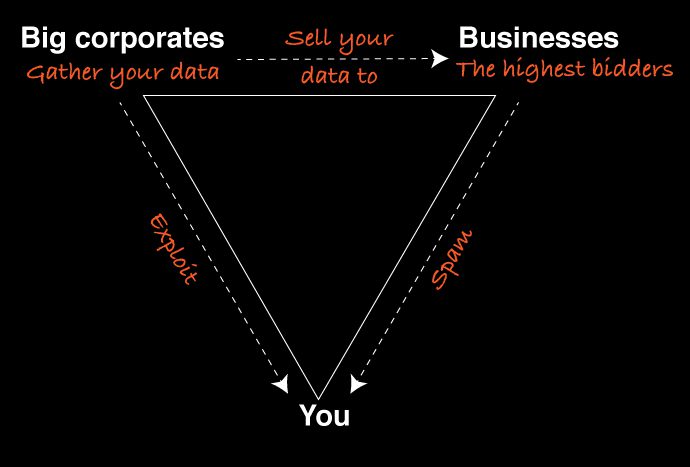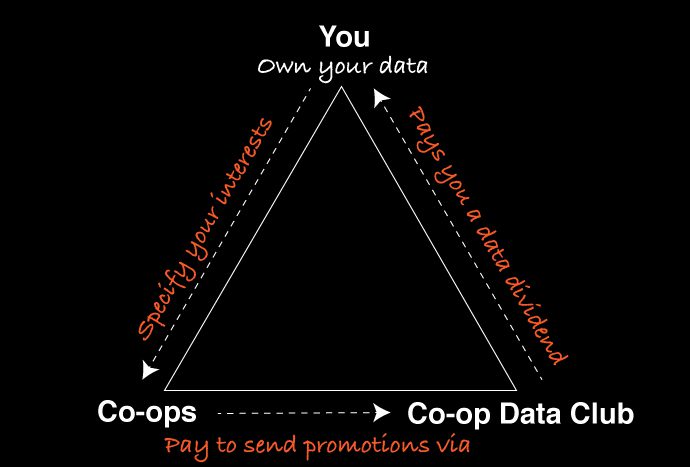Using principle 6 to solve the capital conundrum
A new venture from Oliver Sylvester-Bradley of the Open Co-op and Leo Sammallahti of VME Coop

When it comes to marketing their businesses, co-ops often hit the same challenge: without the profit-driven model of traditional businesses, co-ops find it hard to attract investment for key growth activities such as customer acquisition and marketing – activities that are essential to scale and become sustainable.
In recent years this challenge has been dubbed the ‘capital conundrum’, an issue which only grows in resonance in a digital world dominated by venture capital funded start-ups. At the same time, some unscrupulous corporations make big bucks collecting people’s data in order to sell it to the highest bidder, raising concerns around data ownership and control.
Co-op Data Club (CDC) is a response to these problems, aiming to “flip the old data model on its head”, by leveraging co-operative principle six – co-operation amongst co-ops.
Related: Scottish farmers urged to share data through co-ops to boost productivity
CDC is a collaboration between Oliver Sylvester-Bradley of the Open Co-op and Leo Sammallahti of VME Coop, which, through the co-operative management of data, aims to link new and existing co-ops with the world’s 1.2 billion co-op members.
Currently focusing on email promotions, CDC is offering two ways for co-ops to promote each other. The first is through reciprocal email promotions – that is, enabling co-ops to feature one another in their usual emails to their members. The second is helping to promote co-ops through CDC’s own mailing list, which co-ops would pay a fee to feature in, targeting subscribers who have expressed an interest in the products or services they provide. This fee would then be passed back to individual subscribers in the form of a data dividend, with CDC acting as a data trust to manage this process and access to the data. No data is sold, or shared, or passed on to anyone, and people can unsubscribe at any time.
In a blog post written earlier this year, Leo explains the reasoning behind the focus on email: “many co-ops have an email newsletter, and it would cost nothing and require little effort for them to include promotions of other co-ops in their newsletters.”
To enable this, Leo explains that CDC has created a directory of co-ops that want to promote other co-ops. “It’s almost like a “phonebook” that costs practically nothing to build and maintain. Even though it’s minimalistic, it’s capable of providing substantial and tangible value to co-ops that need help with promoting themselves to an audience of tens if not hundreds of thousands for free.”
There are a number of reasons CDC believes the system they propose will work – firstly, co-ops want to co-operate.
“Co-op Data Club seeks to tap into an underutilised co-operative advantage in marketing: co-ops want to promote others, shareholder firms don’t,” says Leo. When CDC asked co-ops if they would like to promote other co-ops in their email newsletters, all of them said yes. “Had we asked a bunch of shareholder owned firms if they would like to promote other shareholder owned firms in their email newsletters, they would have replied by asking why the hell would they want to do that,” adds Leo.


However, despite co-ops being for cross-promotion in theory, Leo points out that it is actually rare to see this kind of activity happening. “Co-op Data Club aims to change that, by providing a mechanism for co-ops to gain more exposure, more members, and ultimately more customers through targeted cross-promotions between participating co-ops.”
The second reason Leo puts forward in support of CDC’s plans, is that those they are trying to engage – co-op members – are a uniquely engaged market already.
“Existing co-op members and customers make up a very specific niche of consumers,” he says. “These 1.2 billion members are ethically-minded, conscientious consumers that have self-selected co-ops as some of their preferred suppliers, meaning that they are motivated by more than money. This niche, of co-operative consumers, should therefore be the primary target audience for any new startup co-op, community share offer, or existing co-op that is looking to expand its customer base.”
CDC also believes the services it provides will become increasingly useful as technology and the co-op movement moves forward and becomes more globalised. Leo points to examples such as the Drivers Cooperative, which crowdfunded investment from contributors across the world.
Here, he says, the benefits of the club are even greater. “Co-operatives that enable global participation can “call every number” in the Co-op Data Club “phonebook”, making it more useful for them. Ideally, the Co-op Data Club will foster cross-promotion between co-operatives, and as a result subscribers are embedded into a virtuous cycle where receiving emails from one co-operative leads them becoming customers of more co-operatives, that also send emails promoting other co-operatives.”
In the future CDC plans to develop a point system, where co-ops earn points for promoting each other, that could be recognised through things like a scoreboard and annual awards. Points could be earned by co-ops for promoting CDC’s mailing list, and individual subscribers could earn points by opening the emails they receive. These points could have a number of different uses – for individual subscribers, it could be that a certain number of points must be earned before they become a full club member with voting rights, for co-ops, they could use points for more opportunities to be featured in promotions.
Other potential ideas CDC have outlined for the future include enabling co-ops to provide their members with coupon codes for other co-ops, gift card facilities and mutual banner advertising on co-ops’ websites.
A lot of this is at the early ideas stage right now, and CDC is encouraging anyone with any feedback or ideas to get in touch with them. There are currently 36 co-ops listed on CDC’s website as members, and Leo and Oli have set themselves a target of recruiting 200 co-ops to the club by the end of the year.
CDC hopes that its activities will contribute to building not just a stronger global co-operative brand, but a stronger global co-operative movement.
“There are new exciting opportunities in building a ‘brand’, ‘narrative’ or ‘label’ common to co-operatives globally,” says Leo.
“Compared to other businesses, co-operatives are in a unique position to pursue this, because they do not have to start from scratch. The International Cooperative Alliance is already a large democratic membership organisation, with member co-operatives being part of the everyday life of ordinary people across the world.
“However, global co-operation can be far greater than simply a brand that generates positive connotation in the mind of the consumer – it can become a mass movement that makes a tangible positive contribution by shaping the economic, material reality towards our shared ideals as moral human beings.”
